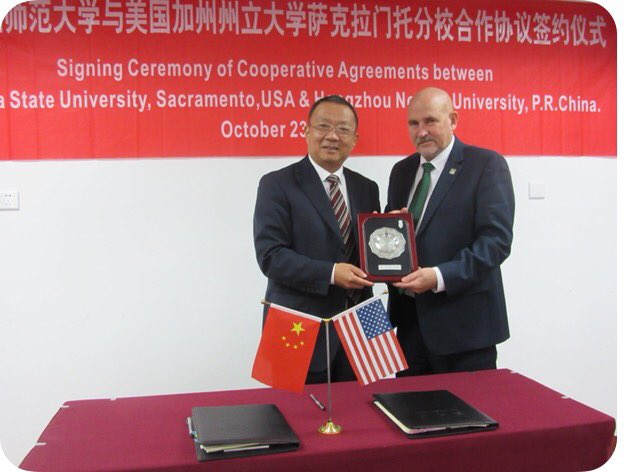President Nelsen inks 6 deals with 3 Chinese universities to swap students, faculty
Courtesy of Robert Nelsen
Sacramento State President Robert Nelsen, right, poses with the president of Hangzhou Normal University, Ye Gao Xiang, after agreeing to three exchange programs.
November 1, 2017
President Robert Nelsen tweeted Sunday that Sacramento State has signed six exchange agreements with three Chinese universities.
According to Paul Hofmann, the Assistant Vice President for International Programs and Global Engagement, agreements with Beijing Union University were signed on Oct. 19, agreements with Beijing Foreign Studies University were signed on Oct. 20 and agreements with Hangzhou Normal University were signed on Oct. 23.
@sacstate signed 6 exchange agreements with Chinese Universities last week including Hangzhou. Jet lagged but happy for our faculty & staff pic.twitter.com/n0wZbCPb4L
— Robert S. Nelsen (@PrezNelsen) October 30, 2017
Hofmann said there were three different types of agreements that were signed.
The first type of agreement is the Ceremonial Memorandums of Understanding, which is a commitment to engage in faculty exchange and participation in joint research. Two Ceremonial Memorandums of Understanding were signed with Beijing Union University and Hangzhou Normal University.
The next type of agreement is the Student Exchange Agreement, which is a commitment to exchange students for a semester or an academic year. Two Student Exchange Agreements were signed with Beijing Union University and Hangzhou Normal University as well.
The final type of agreement is the Articulation Agreement, which is a commitment to split two years of study at each university toward a certificate. Two Articulation Agreements were signed with Beijing Foreign Studies University for international MBA programs and Hangzhou Normal University for MA programs in mathematics.
Hofmann said that most of the work had been done prior to Nelsen’s trip; however, the meeting served to finalize the agreements and introduce the universities’ presidents.
Previously, all international opportunities for Sac State students to study abroad in China or for the University to receive Chinese international students went through the Chancellor’s office, making this Sac State’s first independent international agreement with China.
Sac State is hoping to start the agreements starting in the fall semester of 2018 with one-for-one or two-for-two student swaps. According to Hofmann, exchanges have to be balanced per agreements.
He said that the department hopes to eventually exchange five students at a time, depending on demand from each side.
“It gives us an opportunity to send our students abroad and allow them to experience what’s going on in the world,” said Hofmann.
He said that China, in particular, has seen rapid economic growth, which he called “mind boggling.”
“Change was everywhere, and China drove into me that we too must change, or we, especially our students and our economy, will be left behind,” Nelsen said. “We signed six agreements while we were in China so that our students and faculty could engage in reciprocal exchange programs.”
Nelsen’s tweet said that he was “jetlagged but happy for our faculty (and) staff.”
Additional reporting by Kameron Schmid





























































































































